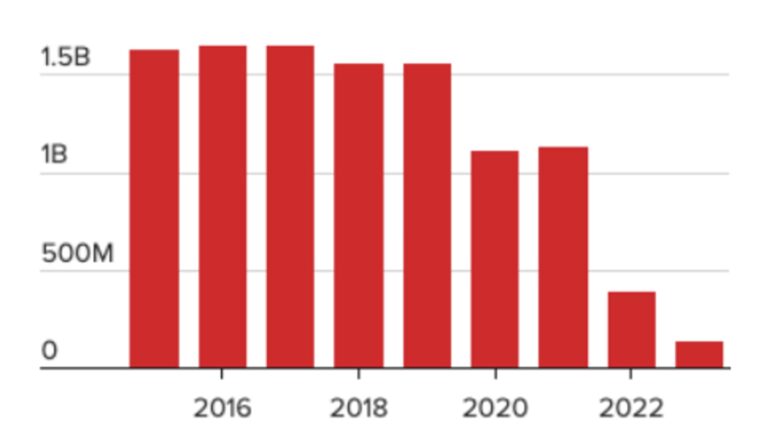I talk about overdraft fees a lot. I dislike the product as banks have been earning billions from their most vulnerable customers. It is also the area where fintech has had a dramatic impact.
Back in 2019, I wrote about the movement towards no overdraft fees as fintech companies provided better options for consumers. This was years before the CFPB put overdraft fees in their crosshairs.
The impact is now being felt at the country’s largest banks. Today, we learned that overdraft fee revenue in 2023 was down 25% at JPMorgan Chase, Wells Fargo and Bank of America. The total is still $2.2 billion which is too much but change like this doesn’t happen quickly.
If and when the CFPB’s new overdraft rules come into effect this number will reduce dramatically. Meanwhile, fintech companies continue to provide a better alternative to overdraft fees.
While we won’t get to zero any time soon, we will continue to see reduced overdraft revenue at large banks, which is a great thing for consumers.
Featured
> Big banks have drastically cut overdraft fees, but customers still paid $2.2 billion last year
Overdraft revenue is on the decline, but recent filings show that JPMorgan Chase and Wells Fargo remain by far the largest generators of the controversial fees.

From Fintech Nexus
> Beem partners with TruStage to offer additional financial protection in case of covered job loss
By Craig Ellingson
Beem is partnering with U.S. insurance, investment and technology provider TruStage to offer the latter’s Payment Guard Insurance as an additional layer of financial security for its members.
> Affirm produced another solid earnings report; the market wanted more
By Fintech Nexus Staff
Affirm produced a solid earnings report with 48% revenue growth and the company now has more than 17 million active customers

Podcast
> Luke Voiles, CEO of Pipe, on the optimal way to approach small business lending
The CEO of Pipe, Luke Voiles, discusses the fintech approach to small business lending and why it is so important to be in… Listen Here.
Also Making News
- Global: Here are the fintech startups that could go public in 2024Could 2024 be the year for fintech IPOs? Quite possibly, according to F-Prime Capital’s State of Fintech 2024 report. F-Prime — a VC firm with over $4.5 billion in assets under management that tracks the performance of emerging, publicly traded and privately held financial technology companies — naturally remains bullish on the fintech space.
- USA: JPMorgan Chase Is Adding Branches—The Rest Of The Industry Shouldn’tJPMorgan Chase plans to build 500 new branches in the next three years. That doesn’t mean other banks should follow suit.
- USA: Can New York’s ‘migrant prepaid card’ boost financial inclusion?The city’s pilot program enables asylum seekers to pay for food and baby products — reducing government overhead while introducing newcomers to the local economy.
- FIS Debuts Interoperable Platform for Sharing Bank DataFIS has debuted a platform that lets its clients’ customers share banking data. The Florida-based global fintech has signed agreements with data networks Akoya, Envestnet, Yodlee, MX and Plaid to integrate into the FIS Open Access platform.
- USA: The FDIC’s First Chief Innovation Officer Made Big Claims. Many Don’t Stack UpIn 2015, fintech founder and eventual FDIC Chief Innovation Officer Sultan Meghji was sitting in a co-working space when a loud bang clapped through the room. It startled his colleagues, a group of founders from the St. Louis startup community, according to a person who was there. Meghji turned to a colleague and said the violent pop gave him flashbacks to the time he was shot.
- USA: JPMorgan Chase dominates AI research in bankingJPMorgan Chase has consolidated its reputation as an AI research powerhouse, according to new data from benchmarking platform Evident.
- USA: The Race to Succeed Goldman’s CEO Just Got More ComplicatedThe strengthening of David Solomon’s grip may cloud John Waldron’s path to the top job.
To sponsor our newsletters and reach 275,000 fintech enthusiasts with your message, contact us here.


